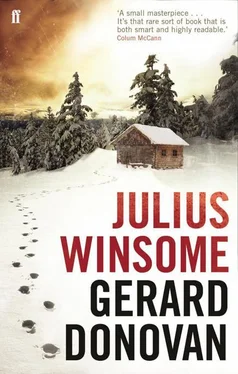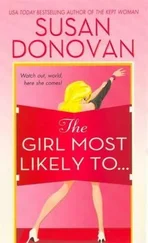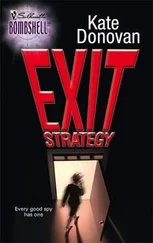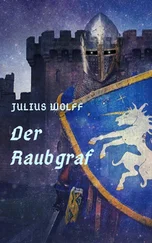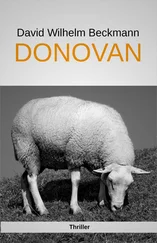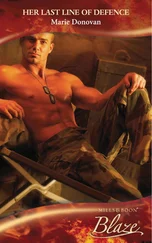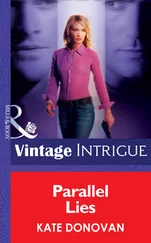OF MY FATHER’S DEATH I REMEMBER THAT IT WAS measured like cups he took into himself of a substance designed to end him, accepted with grace and without complaint. His breath had come shallow for a good year, and the distances between objects in the house, the steps from the bathroom to the chair, from the chair to his bed, grew longer and longer for him. It was good that he was a reading man, since that activity required no extra breathing, and for large portions of the day no-one would have known that his lungs were eaten away from the tobacco, except mornings and evenings that passed in coughing, when he turned himself inside out with it, mostly in the final months.
In Fort Kent, the doctor was careful in how he listened to the chest and the lungs, and always shook his head when I spoke to him as my father waited in the car outside. That was our way—the doctor told me his findings, and I informed my father, who was not a man given to doctor visits, and that was the only way I could get him to visit one: I received the message, I made the translation. Most of the time the doctor said that he should stop smoking the pipe, and I would translate it as, You have to cut down on the smoking.
On the last visit, I got into the car where my father waited.
Well? he said.
The doctor says you will be dead in a month. There was no translating that.
He nodded, Well that’s to be expected. Don’t worry, Julius. You have the house and all those books to take care of.
I drove him home in silence. I wondered if my mother was waiting for him, and if so, where, and if the man I knew was the same one she knew, and how I had never asked him what parts of me were from my mother and what parts were his. Such is what went through my mind as I drove him home in silence.
Three weeks later he took to staying in the chair, and I put blankets round it with a pillow near the head, kept the fire going even though it was April. He slept there too, and I placed some logs on the floor for a footstool. His breath grew louder by the hour and I felt a chill cover him for two days. He stopped speaking then. I saw the pupils in his eyes narrow and knew that he could see me, that I was in his eyes still. I walked my reflection across his eyes, back and forth with logs to the fire and such, to give him the comfort that I was there and not leaving. His voice came back on the third day, and he asked for a Shakespeare, like ordering from a menu at a restaurant, and I waited by the shelves while he chose one.
I’ll take the poems, he said, as I watched the back of his head.
I had the book to him in no time, Collected Sonnets , 1843 edition, London. Next thing he was reading out loud in a singing voice marking the stresses:
That time of year thou mays’t in me behold,
When yellow leaves, or none, or few, do hang
Upon those boughs which shake against the cold
.
He had stopped after the word hang in his frail voice and waited a moment till he fell to reading the next line. I walked around in front of him. He looked up at me and smiled. I held his gaze and after a while saw that his pupils observed nothing, no more light affected them, I was nowhere in him, from now on, only in myself. Nothing to tell him anymore, to say how well I’d done with this or that.
Men came from far away, by train and car, by foot the last part, the distance to the plot, and they stood to attention for this man who served with them. The small church in Fort Kent had rarely seen so many corporals and sergeants and privates ranked equally around a grave. I saw battles in their eyes long forgotten by many, and never known to some, and observed some of them fall with him into that hole in the ground, I mean the part of them that remembered the fear and the rubble of distant towns, or the part that had hoped for better things afterwards. The soldier who fights always hopes that way, my grandfather said, but it’s those who don’t fight who get to decide what things will come. From that day until Claire came out of the woods all those years later, I managed to live on my own, maybe from habit, maybe to honor him. I learned the shape of loss, it was not a stranger to me, since every corner and bench in Fort Kent reminded me of my father, all the places he went. How many times did I pass his grave on my way to buying milk and bread—especially in those weeks after he was first gone, this man of my first thirty years—and wonder how such learning and experience could be switched off like a light.
* * *
I sat in the dark and thought such things that would keep me still, perhaps for my safety, a small trick of nature to protect Julius Winsome.
The fire was well lit and still no shot through the window, though Friday night did feel long because I was listening for phantoms in those woods and half dreaming of Claire, probably because I had seen her twice in a short time, but the dreams and the listening swapped places frequently as I sat in the chair between both, sometimes dreaming that Claire was listening, sometimes watching her with a gun in her hand in the woods, watching me, waiting for me to walk outside the cabin. She shoots, I hold a book to my chest, the bullet sinks into the words and stops before my heart.
I was done with shooting.
ONLY WHEN I WOKE NEXT MORNING IN THE CHAIR DID I know that I had slept the night before. The last few hours before dawn in deep sleep and without a cover had left me sore. I walked stiffly along the shelves of books, the dark corridor. I clapped my hands to get warm. Water for tea, the fire, more logs from the woodpile, and no footprints in the clearing, that was good. A fine crisp Saturday morning, sky blue, some cloud galvanized along a light wind, a calm before the freeze and on the day before the festival. In Fort Kent the children of the town would be bouncing out of bed and rushing to the window, seeing the same sky, same cloud. Then they run to their parents and remind them that the scarecrow festival is the next day. In seven weeks they will wake and check the pine tree on the night before Christmas, that it was still there and lit and ready for the night, and that there was space enough underneath for the night visitor who was perhaps already a speck above the continents, the eternal father holding the reins, knowing each and every chimney, and each and every name of all children. I wished them all the joy they could hold, every last one, and that he’d leave something for them. If I had a child he would be a reader of course, with all the books; still a child needs friends, even on weekends, and that would mean we’d drive to town a lot, but there was the diner for me to wait in. Such thoughts kept me warm that morning until the fire took hold.
I lit my father’s pipe and poured a glass of sherry from the closet into a crystal glass, the one we kept for special occasions. I walked then along the shelves, wondering which book to pick for reading today: the decision was easy in the end, why not? I pulled out Charles Dickens’ A Christmas Carol . Seven weeks too early but that’s why you read ahead, to get into the spirit. And perhaps there was to be a visitor for me soon, a man with a question, a man with a gun. Then I should be outside surely.
From the bedroom I dragged a blanket after me, and walking outside with the sherry on the tray of the book, I threw the bed blanket across a rock out by Hobbes and drank the glass and read for a bit, an hour or so, to give him the feeling he once had with me. It was fairly cold all the same, and eventually I went inside, missing my friend with every step. But a lightness had entered my mind, perhaps leaked gently into it through the long night before, a suggestion that he was at peace now, and that I should be. I was ready for such peace and silence again.
Читать дальше
